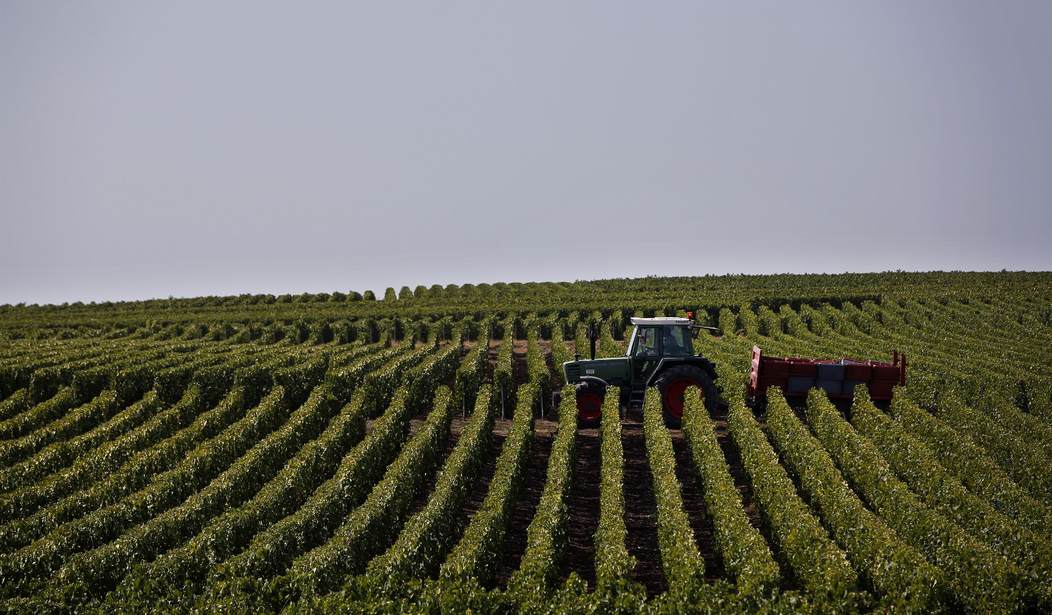I come from a long line of farmers. My Dad farmed much of his life, my paternal grandfather farmed until he decided to change course in about 1932 and become a Ford mechanic, and my maternal grandfather farmed all his life. I grew up in farm country, and a lot of the friends of my youth were from farm families.
Farming, then, is a topic that is kind of dear to me, although I harbor no starry-eyed illusions about the "family farm," as farming is a business, not a holy calling, and business models change; large-scale corporate farming is taking over, and it is doing reasonably well at delivering foodstuffs in the proper quantities, in the proper varieties, and in the proper intervals to support our increasingly urban population around the world.
Now, I told you that so I could tell you this: In the EU, the dabbling in "green" practices has harmed agricultural outputs, so it's good to see that the EU is at least slowing down the implementation of green agriculture and, in so doing, basically telling the climate scolds to get a grip.
If you think farming policy in the European Union isn’t green enough, don’t hold your breath for the next five years.
The agriculture committee (AGRI) in the most recent European Parliament was known for leaning conservative, especially compared to the environment committee (ENVI), with the two clashing over the EU's green farming agenda, the Farm to Fork strategy. AGRI was also strongly pro-farmer — due in large part to the number of farmers who served on it.
Next month’s European election could return a more right-wing assembly to oversee the EU’s €387 billion farm budget, according to POLITICO’s Poll of Polls. At the same time, Green Party lawmakers — the most vocal supporters of the Green Deal — could lose up to a third of their seats, while the number of Socialist and Liberal MEPs could also shrink.
What does this mean for European agriculture?
In practice this means there’s unlikely to be a viable coalition of the center-left, liberal, Green and left that can secure deals such as the nature restorationlaw that sparked controversy in this past term. Meanwhile, the center-right European People’s Party (EPP) will find it easier to build majorities with groups further to the right.
This might make less of a difference in AGRI as groups from the far right to the center left often vote together. However, a further rightward shift will confirm an existing trend: Out with the Green Deal, and in with the “Farm Deal.”
So, the European version of Green New Deal folks are going to have to go to the end of the line, and that's a good thing. Why? Because people need to eat, and green practices aren't going to feed everyone; in case anyone hasn't noticed, there is a little fracas going on in Eastern Europe that will be affecting agricultural production, and not in a good way. Here's why.
First: The two nations involved in the dust-up mentioned above are major agricultural exporters. Russia is a major wheat exporter, exporting over 27 million tons of wheat per year. Ukraine is the largest exporter of corn, at 24.5 million tons per year. Ukraine, in fact, exports more wheat than Canada.
Second: Russia is the world's largest exporter of fertilizer, sending out $20.7 billion tons' worth per year, for 15 percent of the global total. China, incidentally, is the world's third-largest exporter of fertilizer, with Canada in second place.
Third: The combination of recovery from the global COVID-19 hooraw and the adverse effects EU policies have had on farming has resulted in the stagnation in production on the Continent, although things are coming back, slowly, from the COVID-era dips.
So, what does all this mean?
See Related: Forgotten History: Sliced Bread, the Invention to Which All Inventions Are Compared
The Show 'Clarkson's Farm' Should Be Required Viewing for the Whole World
Two of Europe's major food-producing nations are at war with one another. Russia is unlikely to be affected by this in the short term; much of its arable land is well away from the combat zone. While a major wheat-growing area is in the North Caucasus near the border with Ukraine, there are also wheat lands in the South Caucasus, along the Volga, and even in southern Siberia. Ukraine's corn production, though, is not all that far from areas where the conflict is still ongoing.
So some of Europe's major agricultural areas are in or near a war zone, and the EU nations are considering policies that hamstring their own production in the nebulous name of climate change.
Stability matters, and Europe is not the most stable place at the moment. People need to eat, and the EU's Agricultural Committee is acknowledging that reality. For the time being, at least, agricultural interests are taking precedence over climate change interests.
There may be hope for Europe after all.















